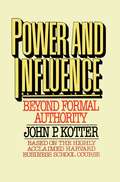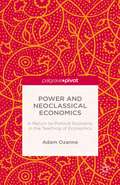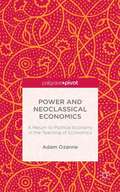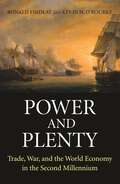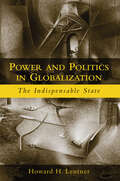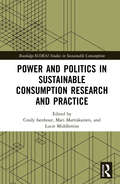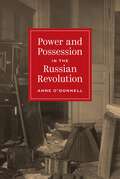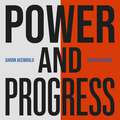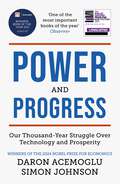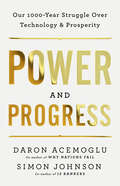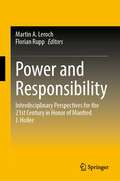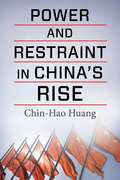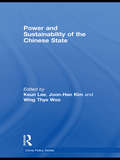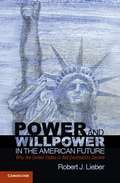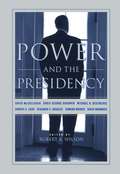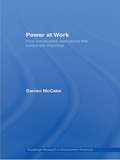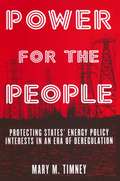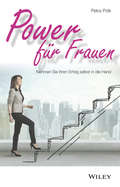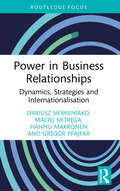- Table View
- List View
Power and Influence: Beyond Formal Authority
by John P. KotterIn today's complex work world, things no longer get done simply because someone issues an order and someone else follows it.Most of us work in socially intricate organizations where we need the help not only of subordinates but of colleagues, superiors, and outsiders to accomplish our goals. This often leaves us in a "power gap" because we must depend on people over whom we have little or no explicit control.This is a book about how to bridge that gap: how to exercise the power and influence you need to get things done through others when your responsibilities exceed your formal authority.Full of original ideas and expert insights about how organizations-and the people in them-function, Power and Influence goes further, demonstrating that lower-level personnel also need strong leadership skills and interpersonal know-how to perform well.Kotter shows how you can develop sufficient resources of "unofficial" power and influence to achieve goals, steer clear of conflicts, foster creative team behavior, and gain the cooperation and support you need from subordinates, coworkers, superiors-even people outside your department or organization.He also shows how you can avoid the twin traps of naivete and cynicism when dealing with power relationships, and how to use your power without abusing it.Power and Influence is essential for top managers who need to overcome the infighting, foot-dragging, and politicking that can destroy both morale and profits; for middle managers who don't want their careers sidetracked by unproductive power struggles; for professionals hindered by bureaucratic obstacles and deadline delays; and for staff workers who have to "manage the boss."This is not a book for those who want to "grab" power for their own ends. But if you'd like to create smooth, responsive working relationships and increase your personal effectiveness on the job, Kotter can show you how-and make the dynamics of power work for you instead of against you.
Power and Leadership
by Joseph S. Nye Jr.In this chapter, Joseph S. Nye, Jr., former dean of Harvard's Kennedy School, considers from a political science perspective the relationship between power and leadership, which he sees as inextricably intertwined. He characterizes power as having both a hard form (coercive) and a soft form (attractive), with each being exercised to some degree by nearly every leader. An effective leader will combine both forms, resulting in what Nye terms "smart power." The right proportions will vary, as will the amounts of hard and soft power available, based on a leader's context. Leaders, followers, and the contexts in which they interact are three key components of the social and power dynamics that define a leadership role. This chapter was originally published as Chapter 12 of "Handbook of Leadership Theory and Practice: A Harvard Business School Centennial Colloquium."
Power and Neoclassical Economics: A Return to Political Economy in the Teaching of Economics
by A. OzanneMainstream economics almost completely ignores the role power plays in determining economic outcomes, which means it can only provide partial explanations of the distribution of wealth and income, and of the problems associated with inequality and poverty. For many, this is a fundamental failing that severely limits its relevance to the real world and is the source of much dissatisfaction with, and cynicism about, economics and economists. Ozanne explains how this neglect of power has come about over the past 150 years and why it is important. He reviews various definitions and theories of power from across the social sciences and proposes a new approach that could bring considerations of power back into standard economic theory and economics teaching. The approach is simple and intuitive, involving little more than re-envisioning the social welfare function as a 'political economy function'. However, if adopted in economics teaching, it could radically change the way young economists are taught to think about economic problems and lead to a 'return to political economy'.
Power and Neoclassical Economics: A Return to Political Economy in the Teaching of Economics
by Adam OzannePower and Neoclassical Economics.
Power and Plenty: Trade, War, and the World Economy in the Second Millennium (The Princeton Economic History of the Western World #30)
by Ronald Findlay Kevin H. O'RourkeInternational trade has shaped the modern world, yet until now no single book has been available for both economists and general readers that traces the history of the international economy from its earliest beginnings to the present day. Power and Plenty fills this gap, providing the first full account of world trade and development over the course of the last millennium. Ronald Findlay and Kevin O'Rourke examine the successive waves of globalization and "deglobalization" that have occurred during the past thousand years, looking closely at the technological and political causes behind these long-term trends. They show how the expansion and contraction of the world economy has been directly tied to the two-way interplay of trade and geopolitics, and how war and peace have been critical determinants of international trade over the very long run. The story they tell is sweeping in scope, one that links the emergence of the Western economies with economic and political developments throughout Eurasia centuries ago. Drawing extensively upon empirical evidence and informing their systematic analysis with insights from contemporary economic theory, Findlay and O'Rourke demonstrate the close interrelationships of trade and warfare, the mutual interdependence of the world's different regions, and the crucial role these factors have played in explaining modern economic growth. Power and Plenty is a must-read for anyone seeking to understand the origins of today's international economy, the forces that continue to shape it, and the economic and political challenges confronting policymakers in the twenty-first century.
Power and Politics in Globalization: The Indispensable State
by Howard H. LentnerFirst published in 2004. Routledge is an imprint of Taylor & Francis, an informa company.
Power and Politics in Sustainable Consumption Research and Practice (Routledge-SCORAI Studies in Sustainable Consumption)
by Cindy Isenhour Lucie Middlemiss Mari MartiskainenWith growing awareness of environmental deterioration, atmospheric pollution and resource depletion, the last several decades have brought increased attention and scrutiny to global consumption levels. However, there are significant and well documented limitations associated with current efforts to encourage more sustainable consumption patterns, ranging from informational and time constraints to the highly individualizing effect of market-based participation. This volume, featuring essays solicited from experts engaged in sustainable consumption research from around the world, presents empirical and theoretical illustrations of the various means through which politics and power influence (un)sustainable consumption practices, policies and perspectives. With chapters on compelling topics including collective action, behaviour-change and the transition movement, the authors discuss why current efforts have largely failed to meet environmental targets and explore promising directions for research, policy and practice. Featuring contributions that will help the reader open up politics and power in ways that are accessible and productive and bridge the gaps with current approaches to sustainable consumption, this book will be of great interest to students and scholars of sustainable consumption and the politics of sustainability.
Power and Politics in World Athletics: A Critical History (Routledge Critical Studies in Sport)
by Jörg KriegerThis book provides the first detailed history of one of the most powerful international sport organisations, the International Association of Athletics Federations (IAAF), since 2019 known as World Athletics. The book critically assesses the internal power relations within the IAAF by focusing on the IAAF leadership. Based on extensive archival research, Power and Politics in World Athletics offers a nuanced analysis of the institutionalised strategies that developed as a reflection of the IAAF’s interests and aims to create a broader understanding of the global sport system. With only six presidents in over a century of existence, the IAAF’s leaders had profound impacts on other international institutions, national stakeholders and sporting participants. Through four sections, the book identifies various key turning points in the history of the governing body of athletics, and explores the IAAF’s foundation, the policies of past IAAF presidents, and controversial issues such as doping, corruption and manipulation through a socio-historical lens. The book shows that while anyone could take part in athletics, policies enacted by each president served to ostracize those groups who did not fit into the IAAF’s vision of an equal playing field. This book is essential reading for anyone with an interest in sport history, sport sociology, the politics of sport, sport management, sport governance, or international organisations.
Power and Possession in the Russian Revolution (Histories Of Economic Life Ser. #27)
by Professor Anne O'DonnellA history that reframes the Bolsheviks&’ unprecedented attempts to abolish private property after the revolutions of 1917 The revolutions of 1917 swept away not only Russia&’s governing authority but also the property order on which it stood. The upheaval sparked waves of dispossession that rapidly moved beyond the seizure of factories and farms from industrialists and landowners, envisioned by Bolshevik revolutionaries, to penetrate the bedrock of social life: the spaces where people lived. In Power and Possession in the Russian Revolution, Anne O&’Donnell reimagines the Bolsheviks&’ unprecedented effort to eradicate private property and to create a new political economy—socialism—to replace it.O&’Donnell&’s account captures the story of property in reverse, showing how the bonds connecting people to their things were broken and how new ways of knowing things, valuing them, and possessing them coalesced amid the political ferment and economic disarray of the Revolution. O&’Donnell reminds us that Russia&’s postrevolutionary confiscation of property, like many other episodes of mass dispossession in the twentieth century, largely escaped traditional forms of record keeping. She repairs this omission, drawing on sources that chronicle the lived experience of upheaval—popular petitions, apartment inspections, internal audits of revolutionary institutions, and records of the political police—to reconstruct an archive of dispossession. The result is an unusually intimate history of the Bolsheviks&’ attempts to conquer people and things.The Bolsheviks&’ reimagining of property not only changed peoples&’ lives and destinies, it formed the foundation of a new type of state—one that eschewed the defense of private property rights in favor of an enduring but enigmatic new domain: socialist state property.
Power and Privilege in Roman Society
by Richard Duncan-JonesHow far were appointments in the Roman Empire based on merit? Did experience matter? What difference did social rank make? This innovative study of the Principate examines the career outcomes of senators and knights by social category. Contrasting patterns emerge from a new database of senatorial careers. Although the highest appointments could reflect experience, a clear preference for the more aristocratic senators is also seen. Bias is visible even in the major army commands and in the most senior civilian posts nominally filled by ballot. In equestrian appointments, successes by the less experienced again suggest the power of social advantage. Senatorial recruitment gradually opened up to include many provincials but Italians still kept their hold on the higher social groupings. The book also considers the senatorial career more widely, while a final section examines slave careers and the phenomenon of voluntary slavery.
Power and Progress: Our Thousand-Year Struggle Over Technology and Prosperity
by Simon Johnson Daron AcemogluTwo bestselling authors deliver a bold new interpretation of why technology has all too often benefited elites - and how we must reshape the path of innovation to create true shared prosperity.A thousand years of history and contemporary evidence make one thing clear. Progress is not automatic but depends on the choices we make about technology. New ways of organizing production and communication can either serve the narrow interests of an elite or become the foundation for widespread prosperity.Much of the wealth generated by agricultural advances during the European Middle Ages was captured by the Church and used to build grand cathedrals while the peasants starved. The first hundred years of industrialization in England delivered stagnant incomes for workers, while making a few people very rich. And throughout the world today, digital technologies and artificial intelligence increase inequality and undermine democracy through excessive automation, massive data collection, and intrusive surveillance.It doesn't have to be this way. Power and Progress demonstrates that the path of technology was once - and can again be - brought under control. The tremendous computing advances of the last half century can become empowering and democratizing tools, but not if all major decisions remain in the hands of a few hubristic tech leaders striving to build a society that elevates their own power and prestige.With their breakthrough economic theory and manifesto for a better society, Acemoglu and Johnson provide the understanding and the vision to reshape how we innovate and who really gains from technological advances so we can create real prosperity for all.(P) 2023 Hachette Audio
Power and Progress: Our Thousand-Year Struggle Over Technology and Prosperity
by Simon Johnson Daron Acemoglu'The blueprint we need for the challenges ahead' Shoshana Zuboff'If you are not already an addict of Daron Acemoglu and Simon Johnson's previous books, Power and Progress is guaranteed to make you one' Jared Diamond'A breathtaking tour of the history and future of technology' Abhijit Banerjee and Esther DufloA bold new interpretation of why technology has all too often benefited elites - and how we must reshape the path of innovation to create true shared prosperity.A thousand years of history and contemporary evidence make one thing clear. Progress is not automatic but depends on the choices we make about technology. New ways of organizing production and communication can either serve the narrow interests of an elite or become the foundation for widespread prosperity.Much of the wealth generated by agricultural advances during the European Middle Ages was captured by the Church and used to build grand cathedrals while the peasants starved. The first hundred years of industrialization in England delivered stagnant incomes for workers, while making a few people very rich. And throughout the world today, digital technologies and artificial intelligence increase inequality and undermine democracy through excessive automation, massive data collection, and intrusive surveillance.It doesn't have to be this way. Power and Progress demonstrates that the path of technology was once - and can again be - brought under control. The tremendous computing advances of the last half century can become empowering and democratizing tools, but not if all major decisions remain in the hands of a few hubristic tech leaders striving to build a society that elevates their own power and prestige.With their breakthrough economic theory and manifesto for a better society, Acemoglu and Johnson provide the understanding and the vision to reshape how we innovate and who really gains from technological advances so we can create real prosperity for all.
Power and Progress: Our Thousand-Year Struggle Over Technology and Prosperity
by Simon Johnson Daron AcemogluThe bestselling co-author of Why Nations Fail and the bestselling co-author of 13 Bankers deliver a bold reinterpretation of economics and history that will fundamentally change how you see the world A thousand years of history and contemporary evidence make one thing clear: progress depends on the choices we make about technology. New ways of organizing production and communication can either serve the narrow interests of an elite or become the foundation for widespread prosperity. The wealth generated by technological improvements in agriculture during the European Middle Ages was captured by the nobility and used to build grand cathedrals, while peasants remained on the edge of starvation. The first hundred years of industrialization in England delivered stagnant incomes for working people. And throughout the world today, digital technologies and artificial intelligence undermine jobs and democracy through excessive automation, massive data collection, and intrusive surveillance. It doesn&’t have to be this way. Power and Progress demonstrates the path of technology was once—and may again—be brought under control. Cutting-edge technological advances can become empowering and democratizing tools, but not if all major decisions remain in the hands of a few hubristic tech leaders. With their bold reinterpretation of economics and history, Daron Acemoglu and Simon Johnson fundamentally change how we see the world, providing the vision needed to redirect innovation so it again benefits most people.
Power and Responsibility: Interdisciplinary Perspectives for the 21st Century in Honor of Manfred J. Holler
by Florian Rupp Martin A. LerochWritten by leading scholars from various disciplines, this book presents current research on topics such as public choice, game theory, and political economy. It features contributions on fundamental, methodological, and empirical issues around the concepts of power and responsibility that strive to bridge the gap between different disciplinary approaches. The contributions fall into roughly four sub-disciplines: voting and voting power, public economics and politics, economics and philosophy, as well as labor economics.On the occasion of his 75th birthday, this book is written in honor of Manfred J. Holler, an economist by training and profession whose work as a guiding light has helped advance our understanding of the interdisciplinary connections of concepts of power and responsibility. He has written many articles and books on game theory, and worked extensively on questions of labor economics, politics, and philosophy.
Power and Restraint in China's Rise (Contemporary Asia in the World)
by Chin-Hao HuangConventional wisdom holds that China’s rise is disrupting the global balance of power in unpredictable ways. However, China has often deferred to the consensus of smaller neighboring countries on regional security rather than running roughshod over them. Why and when does China exercise restraint—and how does this aspect of Chinese statecraft challenge the assumptions of international relations theory?In Power and Restraint in China’s Rise, Chin-Hao Huang argues that a rising power’s aspirations for acceptance provide a key rationale for refraining from coercive measures. He analyzes Chinese foreign policy conduct in the South China Sea, showing how complying with regional norms and accepting constraints improves external perceptions of China and advances other states’ recognition of China as a legitimate power. Huang details how member states of the Association of Southeast Asian Nations have taken a collective approach to defusing tension in maritime disputes, incentivizing China to support regional security initiatives that it had previously resisted. Drawing on this empirical analysis, Huang develops new theoretical perspectives on why great powers eschew coercion in favor of restraint when they seek legitimacy. His framework explains why a dominant state with rising ambitions takes the views and interests of small states into account, as well as how collective action can induce change in a major power’s behavior. Offering new insight into the causes and consequences of change in recent Chinese foreign policy, this book has significant implications for the future of engagement with China.
Power and Sustainability of the Chinese State (China Policy Series)
by Keun Lee Joon-Han Kim Wing Thye WooSince the start of the 21st century China has risen to the status of an important world power. This book examines Chinese power, focusing in particular, although not exclusively, on its economic capabilities, and considering how this is likely to develop in the future. It provides a detailed assessment of the key facets of Chinese power today, including GDP, growth, multinationals, and technological and scientific innovation. It identifies the key trends in these areas, compares China’s experience with other important global powers such as the US, and considers how this is viewed by the Chinese themselves, including through the lens of their popular culture and mass media. It goes on to identify the foremost problems facing China and the Chinese state today, including fiscal management and public finance, poverty, inequality and rural development, and considers whether China is capable of overcoming these challenges and continuing its remarkable economic development. It addresses crucial questions such as the impact of globalization on Chinese power, and whether Communist Party rule is sustainable for the foreseeable future.
Power and Welfare: Understanding Citizens' Encounters with State Welfare (Social And Political Power Mup Ser.)
by Nanna Mik-Meyer Kaspar VillardsenIn the welfare provision of today, power takes both the shape of juridical sanctions and of attractive offers for self-development. When state institutions punish criminals, remove children at risk, or enforce sanctions upon welfare recipients the question of power is immediately urgent. It is less readily evident that power is at stake when institutions educate, counsel or ‘empower’ citizens. This book offers a framework for understanding and analyzing these complex and implicit forms of power at play in the encounters between citizens and welfare institutions. Taking as its starting point the idea that power takes many different shapes, and that different approaches to power may be necessary in the diverse contexts where citizens encounter welfare professionals, the book demonstrates how significant social theorists, spanning from Goffman to Foucault, can be used for inquiries into these encounters. Guiding the reader from their epistemological foundations to lucid ‘state of the art’ case examples, the book unpacks each of its six theoretical perspectives, and explains selected key concepts and explicates their potential for analysis. The final chapter discusses the usefulness of the theoretical approaches, their weaknesses and indicates some possibilities of theoretical integration. Including case studies of patients, nursing home residents, unemployed people, homeless people, and young offenders, from the USA, Denmark, France, Sweden, Canada, and Australia, Power and Welfare is designed for students and researchers of social policy, sociology, anthropology, political science, education, nursing and social work.
Power and Willpower in the American Future
by Robert J. LieberTo argue against the widely proclaimed idea of American decline, as this book does, might seem a lonely task. After all, the problems are real and serious. Yet if we take a longer view, much of the discourse about decline appears exaggerated, hyperbolic, and ahistorical. Why? First, because of the deep underlying strengths of the United States. These include not only size, population, demography, and resources, but also the scale and importance of its economy and financial markets, its scientific research and technology, its competitiveness, its military power, and its attractiveness to talented immigrants. Second, there is the weight of history and of American exceptionalism. Throughout its history, the United States has repeatedly faced and eventually overcome daunting challenges and crises. Contrary to a prevailing pessimism, there is nothing inevitable about American decline. Flexibility, adaptability, and the capacity for course correction provide the United States with a unique resilience that has proved invaluable in the past and will do so in the future. Ultimately, the ability to avoid serious decline is less a question of material factors than of policy, leadership, and political will.
Power and the Presidency
by Robert A. WilsonThis sterling collection of original, never-before-published essays on six fascinating contemporary presidents by some of the leading presidential biographers of our time is must reading for anyone interested in American politics, the history of the American presidency, or the lives of the presidents. Each essay-extending and elaborating on lectures originally delivered as part of the Montgomery Lecture Series at Dartmouth University-explores how a particular president came to power, wielded power, and was changed by power, and how each presidency affected the power of the office itself. The presidencies addressed are those of Roosevelt, Eisenhower, Kennedy, Johnson, Reagan, and Clinton. Published as our nation begins the process of electing the 43rd president, during a time when some believe the independence of the office itself is at stake, Power and the Presidency is a timely and thought-provoking look at the nature of power in American democracy.
Power and the Vote
by Brian MinHow do developing states decide who gets access to public goods like electricity, water, and education? Power and the Vote breaks new ground by showing that the provision of seemingly universal public goods is intricately shaped by electoral priorities. In doing so, this book introduces new methods using high-resolution satellite imagery to study the distribution of electricity across and within the developing world. Combining cross-national evidence with detailed sub-national analysis and village-level data from India, Power and the Vote affirms the power of electoral incentives in shaping the distribution of public goods and challenges the view that democracy is a luxury of the rich with little relevance to the world's poor.
Power at Work: How Employees Reproduce the Corporate Machine (Routledge Research In Employment Relations Ser.)
by Darren McCabeProviding detailed insights into working life, McCabe, a well known author in the fields of organization studies, labour process theory and critical management studies offers a distinctive approach to innovation in the work place. In this ethnography of a major US bank he argues that many innovations associated with thenew corporation seem to re
Power for the People: Protecting States' Energy Policy Interests in an Era of Deregulation
by Mary M. TimneyPower for the People examines the tension between the social and political interests of states and the market in the case of energy policy. The author has conducted extensive research on California's experience with electricity restructuring, and assesses how the diverging interests of the market vs. the state resulted in that notable failure of energy deregulation. She includes overviews of many other states, and offers analysis on how states can balance their own interests with the market without imposing high costs on their citizens or the environment. This is the first book to look at deregulation from the point of view of the consumer and the states. Exceptionally clear, balanced, and well-written, it is essential reading for anyone interested in public policy, energy studies, and government deregulation of services, and would also be an ideal supplement for any courses in these areas.
Power from Within: A Guide to Success as a Medical Malpractice Defense Expert
by Jeffrey A. Krompier, Esq.There is no end in sight to the frequency with which physicians, nursing professionals and other healthcare providers will become lawsuit targets in our litigious society. While politicians, practitioners, insurance companies and trial attorneys debate the nation’s chronic "malpractice crisis", suits continue to be filed. In addition, once COVID-19 is behind us and the unprecedented public support for health care providers wanes, as it will, it is anticipated that physicians and nurses will become malpractice defendants to a remarkable degree. National legislative fact-finding committees and investigative bodies, which may be charged with the responsibility of pursuing a solution, likely will never achieve a global remedy. Although curtailed by some states, national legislation has not addressed baseless malpractice suites or grossly excessive monetary verdicts. Another approach exists, however. Health care providers can impact the existing system and influence the malpractice environments in a tangible, positive and powerful fashion. Although there will be debate over tort reform in order to bring some degree of protection to the malpractice defendant, individual case success, defined from the defendant’s perspective as a "no-cause" trial verdict, can be realized if well-credentialed and experienced health care professionals are willing to assist the malpractice defense bar as expert witnesses. The benefits to the health care community and the individuals who are willing to participate are innumerable and worth considering.
Power für Frauen: Nehmen Sie Ihren Erfolg selbst in die Hand
by Petra PolkPetra Polk unterstützt Frauen darin, erfolgreicher zu werden. Sie zeigt auf, wie Frauen es schaffen, aus eigenem Antrieb heraus ihren Erfolgsweg zu gehen und richtet sich dabei insbesondere an Frauen im Business und jene auf dem Karriereweg. Petra Polk behandelt in ihrem Buch Themen wie das richtige Mindset, Selbstmarketing, Selbstwertschätzung und Netzwerk-Strategien. Aber auch viele Glaubenssätze, die Frauen am Erfolg hindern, werden betrachtet. Themen wie das Rollenbild werden ebenso angesprochen, wie Neid, Stutenbissigkeit und die permanente Selbstunterschätzung. Die Autorin zeigt jedoch nicht nur auf, wo sich viele Frauen meist selbst im Weg stehen, sondern sie gibt gleichzeitig ganz konkrete Anleitungen, wie sich Frau künftig auf Erfolg ausrichtet. Die Opferrolle - in der sich viele Frauen leider wohlfühlen - funktioniert nicht: Statt falschem Rollendenken und unnötigen Jammerstrategien müssen sich Frauen auf die aktive Gestaltung der persönlichen Erfolgsstrategie konzentrieren. Dabei stellt die Autorin unangenehme Fragen zur Selbstreflexion und sticht mit der imaginären Nadel in jene Stellen, mit denen sich Frauen normalerweise nicht so gerne auseinandersetzen. Als Belohnung erhält die Leserin - neben der Erkenntnis, dass sie letztlich immer nur ganz alleine für ihren Erfolg verantwortlich ist - die erforderlichen Werkzeuge zur Umsetzung.
Power in Business Relationships: Dynamics, Strategies and Internationalisation (Routledge Focus on Business and Management)
by Dariusz Siemieniako Maciej Mitręga Hannu Makkonen Gregor PfajfarFocusing on the issue of power as the main building block of relationships between business buyers and sellers, this book explains the complex nature of power with its multidimensional and multi-directional character. As a complex construct, inter-firm power is treated as a matter of perception as well as in terms of total and relative power. The book analyses extensively the issue of power asymmetry with its dynamics and its consequences for business-to-business (B2B) relationships, particularly analyzing the dynamic mechanism of power. Various theoretical domains or research streams regarding managing an asymmetrical business relationship by the weaker partner are also examined. Based on the studies of other scholars as well as on the authors' own research, this book shows how weaker suppliers or buyers deal with high-power partners in business relationships and the approaches of more powerful parties to asymmetrical relationship development. Additionally, the book presents the specific nature of power in international B2B relationships, including its connection to culture and conflict, as well as how to handle power in managing export performance within international B2B relationships. It is written for scholars and students who are interested in academic research concerning B2B marketing and B2B relationship marketing domains, specifically those who are interested in literature dealing with supply chain management, key account management, relationship portfolio management, distribution channel management and the network approach.
